 Petzlover
Petzlover Beauceron is originated from France but Schnauzer is originated from Germany. Beauceron may grow 20 cm / 8 inches higher than Schnauzer. Beauceron may weigh 30 kg / 67 pounds more than Schnauzer. Both Beauceron and Schnauzer has almost same life span. Both Beauceron and Schnauzer has almost same litter size. Beauceron requires Low Maintenance. But Schnauzer requires Moderate Maintenance
Beauceron is originated from France but Schnauzer is originated from Germany. Beauceron may grow 20 cm / 8 inches higher than Schnauzer. Beauceron may weigh 30 kg / 67 pounds more than Schnauzer. Both Beauceron and Schnauzer has almost same life span. Both Beauceron and Schnauzer has almost same litter size. Beauceron requires Low Maintenance. But Schnauzer requires Moderate Maintenance
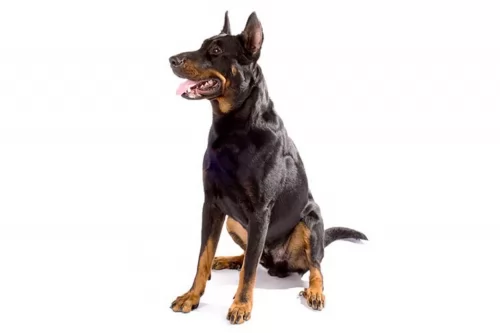 Sometimes referred to as the king of sheepdogs, the Beauceron is a French dog breed that happens to be an extraordinary herding dog too. He instinctively rounds up livestock without even being trained to do so. The dog is also known as Berger de Beauce, originating from the Beauce region in France and is closely related to the Briard or Berger de Brie.
Sometimes referred to as the king of sheepdogs, the Beauceron is a French dog breed that happens to be an extraordinary herding dog too. He instinctively rounds up livestock without even being trained to do so. The dog is also known as Berger de Beauce, originating from the Beauce region in France and is closely related to the Briard or Berger de Brie.
This French breed’s origin goes back to the late 16th century, and the Beauceron was divided into two working types way back in 1863 - the dog with the long coat was known as Berger de Brie or Briard while the short-coated dog became known as Beauceron. It was in 1922 that a club for this dog breed was established, and the Beauceron Club of America was established in 1980, only recently receiving recognition by the American Kennel Club.
 These dogs hail from Germany and are particularly well known for their stern faces and their facial hair - the mustache and eyebrows. You get 3 types of Schnauzer – the Miniature, Standard and Giant.
These dogs hail from Germany and are particularly well known for their stern faces and their facial hair - the mustache and eyebrows. You get 3 types of Schnauzer – the Miniature, Standard and Giant.
These dogs have always been used for their rat catching skills. The Standard Schnauzer is also known as Mittelschnauzer and they have been categorized as working dogs but also as Terriers.
They've always been good herders of livestock and have been regarded as a good all-round farm dog. Most Standard Schnauzers have earned American Kennel Club (AKC) herding titles. They also make excellent watchdogs.
A breed standard for this dog was written in 1880. Also, the Bavarian Schnauzer Klub was formed in Munich in 1907.
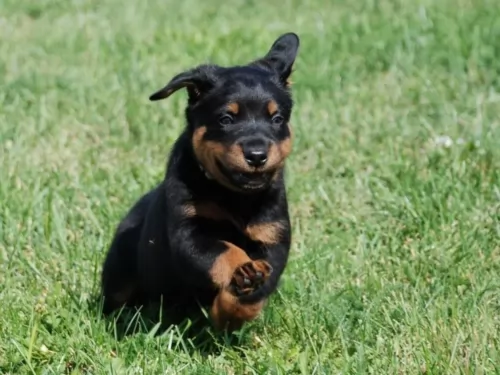 The Beauceron is an intelligent dog, just by looking at the alert, bright face. He is a muscular, large dog breed, standing up to 71cm in height and weighing in at up to 50kg. You’ll recognize him with his dark black coat with red markings, particularly around the feet, which interestingly gives this breed the French nickname Bas Rouge. It means red stockings. Harlequin, tri-coloured grey, black and tan is also recognized as a color.
The Beauceron is an intelligent dog, just by looking at the alert, bright face. He is a muscular, large dog breed, standing up to 71cm in height and weighing in at up to 50kg. You’ll recognize him with his dark black coat with red markings, particularly around the feet, which interestingly gives this breed the French nickname Bas Rouge. It means red stockings. Harlequin, tri-coloured grey, black and tan is also recognized as a color.
The coat is rough, short and dense, the alert eyes dark brown and the ears are set high and can be cropped or natural. The natural ears are half pricked or drop ears and are fairly short. Looking similar to the Doberman and Rottweiler but with a long tail, this French Shepherd dog is somewhat slimmer but with a foreboding appearance. He is solid, well proportioned and well muscled and gives the impression of strength. He has a tolerant nature and will fit in well with a family when trained and socialized.
 You get the miniature and giant Schnauzer as well as the Standard. The Standard Schnauzer stands at between 43 to 51cm and weighs between 14 and 20kg. The dog comes in different color variants - black, black and silver and a greyish color.They have wiry coats that don’t shed much.
You get the miniature and giant Schnauzer as well as the Standard. The Standard Schnauzer stands at between 43 to 51cm and weighs between 14 and 20kg. The dog comes in different color variants - black, black and silver and a greyish color.They have wiry coats that don’t shed much.
They are squarely and robustly built and a typical feature is the mustache, beard and significant eyebrows of the dog. The ears are set high and were once clipped but they are left floppy these days.
The tail has always been traditionally cropped to around three vertebrae,giving the dog a distinctive look, but now it is often left as is and is medium length and curls over the dog’s back.
The Schnauzie is a seriously intelligent dog and this makes them highly trainable so that he can obey quite a few commands. These dogs get bored easily and will require exercise and games that will stimulate him mentally and physically.
They’re alert too, and will bark in warning at any intruders, making them excellent watchdogs. Other notable characteristics are courage and stamina and they have been used for search and rescue work.
These dogs have strong personalities, and are inclined to be stubborn so you want to be sure that they are trained and socialized. This makes them more amicable to be around – they’re obedient and know their place.
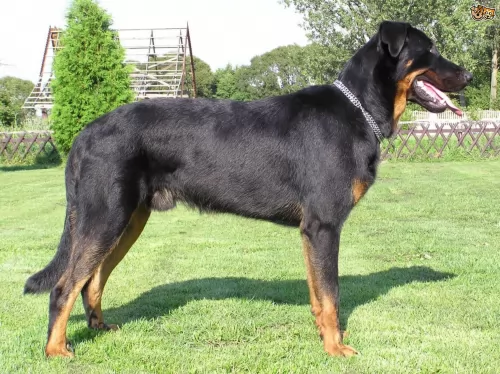 Strong, big, confident and good-looking the Beauceron makes an excellent watchdog, guarding the human family that he is so devoted too. He is a good friend and companion and is tolerant with children and other pets.
Strong, big, confident and good-looking the Beauceron makes an excellent watchdog, guarding the human family that he is so devoted too. He is a good friend and companion and is tolerant with children and other pets.
He is such a clever breed too, and its small wonder that he has always been sought after for hard work – herding, shepherding and even rescue work. When he’s not involved in working, at home, he’s just your big, devoted friend.
 Energetic, strong-willed and loyal, the Schnauzer can be an affectionate friend for children in the home as well as adults.
Energetic, strong-willed and loyal, the Schnauzer can be an affectionate friend for children in the home as well as adults.
He is cool towards strangers and he is also a bit snooty and aggressive with other dogs, but if he is brought up with them, he will show some loyalty and friendship towards them too.
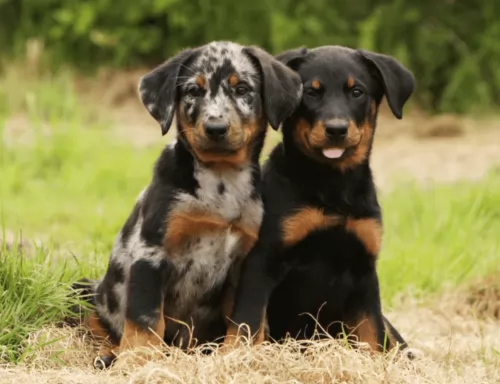 It’s such a nice strong, good-looking dog this, you can’t think of anything going wrong with him. His lifespan is anything from 10 to 14 years and the dog is pretty robust. Being a large breed and a pedigree, he is prone to some common ailments. When you suspect your beloved pet has any health issue, don’t hesitate to get him to the vet.
It’s such a nice strong, good-looking dog this, you can’t think of anything going wrong with him. His lifespan is anything from 10 to 14 years and the dog is pretty robust. Being a large breed and a pedigree, he is prone to some common ailments. When you suspect your beloved pet has any health issue, don’t hesitate to get him to the vet.
A painful disorder that affects larger dogs and brought about by an abnormal development in the joints.
Also a painful condition where the stomach twists so that the blood supply is cut off. Large breeds with deep chests are more prone to developing the condition. Rapid breathing and signs of pain can be indicative of this ailment.
 Schnauzers are very healthy dogs. Nonetheless even these dogs can succumb to some of the many dog illnesses there are.
Schnauzers are very healthy dogs. Nonetheless even these dogs can succumb to some of the many dog illnesses there are.
Hip dysplasia is a common dog ailment and the Schnauzer isn’t immune to it. Hip dysplasia can be very sad in dogs as it can cripple a dog, with painful arthritis being his lot as well. It is no comfort for dog owners to know that hip dysplasia is common in most dog breeds – they are devastated when their once playful dog is brought down by hip dysplasia and exhibits signs of stiffness and pain.
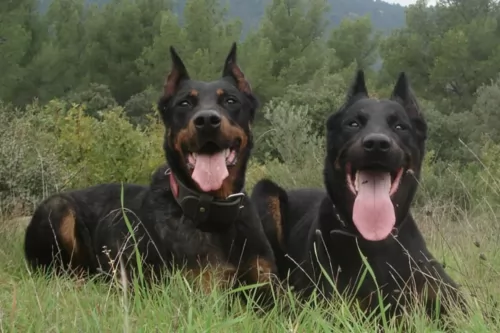 This is a large, hard-working, energetic dog and he will need high-quality food, whether commercially manufactured or home-prepared. The best commercially manufactured dog foods produce foods with the right balance of minerals and vitamins in keeping with your dog’s age, his activities and his stage of life (illness, senior, puppy). If you’re unsure about what to feed your Beauceron, speak to your vet to be 100% that you are meeting his nutritional demands, and always ensure a bowl of cool, clean water is constantly available.
This is a large, hard-working, energetic dog and he will need high-quality food, whether commercially manufactured or home-prepared. The best commercially manufactured dog foods produce foods with the right balance of minerals and vitamins in keeping with your dog’s age, his activities and his stage of life (illness, senior, puppy). If you’re unsure about what to feed your Beauceron, speak to your vet to be 100% that you are meeting his nutritional demands, and always ensure a bowl of cool, clean water is constantly available.
You’re lucky with the Beauceron as he is a low shedding, low maintenance dog with his short coat. He doesn’t require any trimming but will need a good brush twice a week to rid him of loose hairs. Clean his teeth with a special dog toothbrush and toothpaste to avoid plaque buildup. Never use human toothpaste. Clip his nails if he doesn’t wear them down naturally.
This is a big, strong, energetic dog, and you owe it to him to ensure he gets lots of exercise – runs, walks and ball games. If you can’t be a responsible dog owner, don’t own a breed like this as he can become destructive if not kept active.
 Your Schnauzer will need to have his hair brushed twice a week as well as being professionally groomed. This is by hand-stripping or by clipping.
Your Schnauzer will need to have his hair brushed twice a week as well as being professionally groomed. This is by hand-stripping or by clipping.
Standard Schnauzers have lots of energy and will require adequate exercise every day – walks, ball games and runs off the leash.
Check his eyes and make sure there is no discharge. Check inside the ears and make sure there is no sign of redness and discharge. Look inside his mouth for rotting teeth. Bad teeth can cause lots of health problems with a dog, not just in terms of the teeth, but bad teeth can negatively affect other parts of the body too.
You want your Schnauzer to benefit from good food, after all nourishing food contributes to good health and longevity. If you choose to give your Schnauzer one of the commercially manufactured dog foods there are, make sure it is one of the better brands with more natural ingredients, The cheaper ones are filled with toxic ingredients.
Choose food according to his age, size and activity levels. To add some variety, feed him some home made food twice a week which can be added to his dry kibble. Boiled chicken, brown rice or pasta and spinach, sweet potatoes and carrots are a healthy choice for your pet. Try and include some raw meat into the diet. Ensure there is always a bowl of fresh, cool water for him.